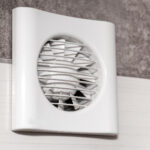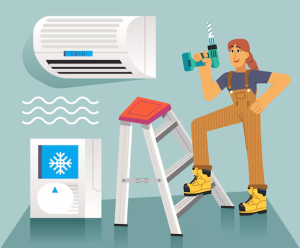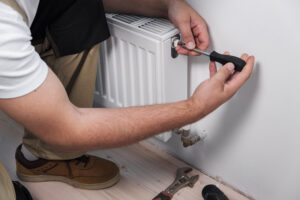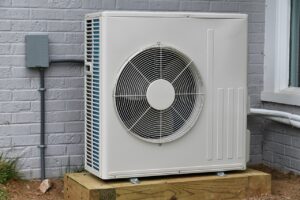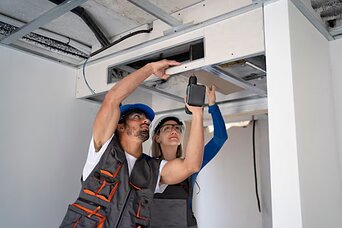
An HVAC system is one of the most critical components of your home. It keeps your indoor environment comfortable throughout the year, maintaining the perfect balance between temperature, humidity, and air quality. However, like any other appliance, your HVAC system has a lifespan, and there comes a time when repairs are no longer sufficient. Recognizing when to replace your HVAC system is essential to ensure your home remains comfortable and energy efficient.
In this blog, we’ll explore five key signs indicating it’s time to replace your HVAC system. By understanding these signs, you can make informed decisions, save money in the long run, and avoid the discomfort of an unexpected system breakdown.
Signs You Should Notice
1. Your HVAC System is Over 10-15 Years Old
The average lifespan of an HVAC system is around 10 to 15 years, depending on usage, maintenance, and the type of system. While routine maintenance can extend its life, even a well-maintained system will eventually wear out. If your system is within or beyond this age range, it’s time to start considering a replacement.
Older systems are less energy-efficient and more prone to frequent breakdowns. Modern HVAC systems, on the other hand, come equipped with advanced technology designed to reduce energy consumption, improve performance, and lower your utility bills. Investing in a new HVAC system can save you money in the long run by reducing energy costs and repair expenses.
Pro Tip: Schedule an HVAC assessment with trusted professionals like Turner On Services. They can help you determine if your aging system is due for an upgrade.
2. Frequent and Costly Repairs
Have you noticed that your HVAC system seems to need repairs more often? Frequent repairs can quickly add up, making it more cost-effective to replace the entire system rather than continue patching it up. A good rule of thumb is the “$5,000 rule”: multiply the cost of a repair by the age of your system. If the result exceeds $5,000, it’s more economical to replace the unit.
For example, if your 12-year-old HVAC system requires a $600 repair, the calculation would be 12 x $600 = $7,200. In this case, replacing the system is a better financial decision. Additionally, repeated repairs indicate that your system is no longer reliable and could fail at the most inconvenient times, such as during extreme weather.
3. Rising Energy Bills
An HVAC system that’s struggling to perform efficiently will consume more energy, leading to higher utility bills. If you’ve noticed a steady increase in your energy costs without any significant changes in your usage patterns, your HVAC system could be the culprit.
Older systems lose efficiency over time, even with regular maintenance. In contrast, newer HVAC systems are designed to meet modern energy efficiency standards, often featuring ENERGY STAR® certification. Upgrading to a high-efficiency system can drastically reduce your energy bills and environmental footprint.
What You Can Do: Contact Turner On Services for a consultation. They can recommend an energy-efficient system tailored to your needs and budget.
4. Inconsistent Temperatures
Uneven heating or cooling throughout your home is another clear sign that your HVAC system is no longer functioning effectively. You may notice some rooms are too hot while others are too cold, or the system struggles to maintain a consistent temperature.
Inconsistent temperatures often indicate:
• Leaky ductwork
• An improperly sized HVAC system
• A failing compressor or other major component
While some of these issues can be repaired, they’re often signs of a system that’s past its prime. Replacing your HVAC system with a properly sized and modern unit will ensure even heating and cooling throughout your home.
5. Poor Indoor Air Quality
Your HVAC system plays a crucial role in maintaining indoor air quality by filtering out dust, allergens, and pollutants. Over time, an aging system may lose its ability to filter air effectively, leading to:
• Increased dust and allergens in your home
• Persistent odors
• Higher humidity levels
• Mold or mildew growth
If you’ve noticed a decline in air quality, it’s time to evaluate your HVAC system. Modern systems come with advanced filtration and humidity control features, ensuring a healthier indoor environment for you and your family.
Benefits of Replacing Your HVAC System
While replacing your HVAC system may seem like a significant investment, the benefits far outweigh the costs. Here are some advantages of upgrading:
• Enhanced Energy Efficiency: Lower utility bills and a reduced carbon footprint.
• Improved Comfort: Consistent temperatures and better humidity control.
• Advanced Features: Smart thermostats, zoning systems, and improved air filtration.
• Peace of Mind: Reliable performance and fewer unexpected breakdowns.
• Increased Home Value: A new HVAC system can boost your home’s resale value.
What to Consider When Replacing Your HVAC System
If you’ve decided it’s time to replace your HVAC system, here are some factors to consider ensuring you make the best choice for your home and budget:
1. System Size and Capacity
Choosing the right size HVAC system is crucial. An oversized system can lead to short cycling and increased wear and tear, while an undersized system will struggle to maintain comfort. Consult a professional to calculate the correct size based on your home’s square footage, insulation, and layout.
2. Energy Efficiency Ratings
Look for systems with high SEER (Seasonal Energy Efficiency Ratio) ratings. A higher SEER rating means greater efficiency, which translates to lower energy bills.
3. Advanced Features
Modern HVAC systems come with a variety of features, such as programmable thermostats, zoning capabilities, and smart controls. These features enhance convenience and efficiency, allowing you to customize your comfort settings.
4. Rebates and Incentives
Many utility companies and government programs offer rebates or tax credits for installing energy-efficient HVAC systems. Be sure to research available incentives to offset the upfront cost.
The Importance of Regular Maintenance After Replacement
Replacing your HVAC system is a significant investment, and regular maintenance is key to protecting it. Schedule routine check-ups to ensure your new system operates at peak efficiency and lasts as long as possible. Maintenance tasks include:
• Cleaning or replacing air filters
• Inspecting and cleaning ductwork
• Checking refrigerant levels
• Lubricating moving parts
• Verifying thermostat calibration
By staying proactive with maintenance, you can maximize the lifespan and performance of your new HVAC system.
Is Your HVAC System Up for Replacement?
Recognizing the signs that it’s time to replace your HVAC system can save you from costly repairs, high energy bills, and discomfort in your home. Whether your system is aging, requires frequent repairs, or no longer maintains consistent temperatures, investing in a new HVAC system is a smart decision.
For expert guidance and top-notch service, reach out to Turner On Services. Their team of professionals will ensure your home remains comfortable, energy-efficient, and equipped with the latest HVAC technology.
Don’t wait until your HVAC system fails. Schedule a consultation today and enjoy the benefits of a modern, efficient, and reliable system.


